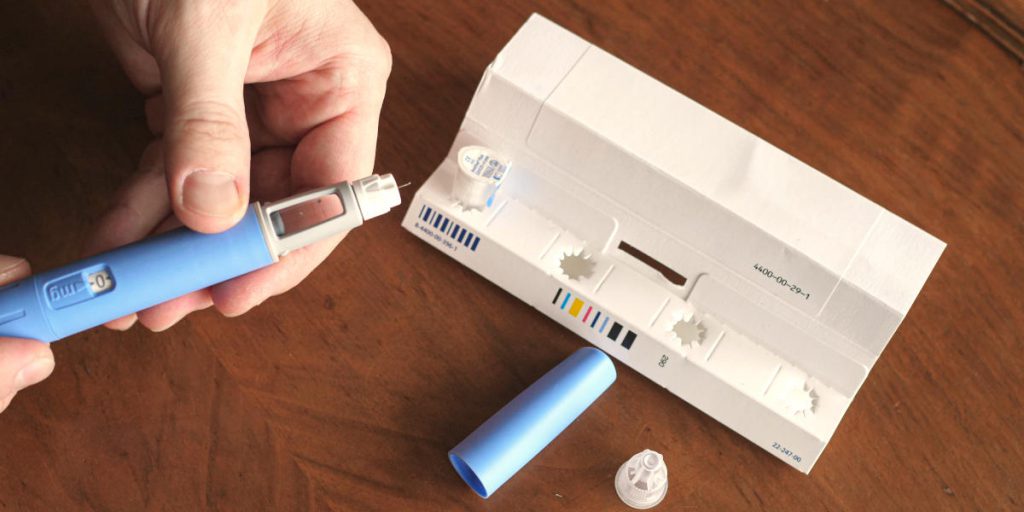The European Association for the Study of Diabetes (EASD) took place from the 19th to the 23rd of September in Stockholm, Sweden.
Covering all aspects of diabetes research, we’re looking back at some of the top papers about type 2 diabetes presented at this year’s congress.

Obesity Drug More Than Halves the Risk of Type 2 Diabetes
Weekly injections of semaglutide, often known as Ozempic or Wegovy, were shown to reduce the risk of type 2 diabetes by 61% in people with prediabetes or normal blood glucose levels.
Analysing the data from two separate trials comprising of a total of 2,764 participants who were administered semaglutide, the researchers found significant decreases in the risk of developing type 2 diabetes in the next decade.
Dr W. Timothy Garvey of the Department of Nutrition Sciences, University of Alabama, Birmingham, AL, USA, who led the research said: “Given the rising rates of obesity and diabetes, semaglutide could be used effectively to reduce the burden of these chronic diseases.”

Waist-to-Hip Ratio, Not BMI, a Stronger Predictor of Early Death
According to new research, Body Mass Index (BMI) cannot be used to reliably predict the risk of disease or mortality in the same way waist-to-hip ratio (WHR) can.
With BMI not accounting for fat distribution, someone with more fat around their waist may have the same BMI as a person of the same age and height who stores fat around their hips.
As higher levels of abdominal and visceral fat are associated with cardiometabolic diseases, WHR is, therefore, a more reliable measure than BMI when it comes to predicting the risk of certain conditions and even early death.
Ifran Khan, a medical student at the College of Medicine and Health, University College Cork, Cork, Ireland, who was involved in the research, said: “WHR, however, better reflects levels of abdominal fat, including visceral fat, which wraps around the organs deep inside the body and raises the risk of a range of conditions, including type 2 diabetes and heart disease.”

Drinking at Least Four Cups of Tea a Day Reduces the Risk of Developing Type 2 Diabetes
One study, in particular, hit the mainstream headlines after claiming that drinking four cups of tea daily reduced the risk of type 2 diabetes.
The research suggests that people who consumed less than four cups of tea daily have a 4% reduced risk of developing diabetes, while those who drink four or more cups of tea are at 17% less risk.
Xiaying Li, from the Wuhan University of Science and Technology in China and the study’s lead author, said: “Our results are exciting because they suggest that people can do something as simple as drinking four cups of tea a day to potentially lessen their risk of developing type 2 diabetes.”
While the news was indeed exciting for tea-drinkers, experts were quick to express caution over the results.
“Everyone drinks fluids. If there is an effect here (and that’s a big if), it might be not about the tea they drink, but about what they don’t drink. One can’t tell at the moment. It seems unlikely that a large randomized controlled trial could be done to disambiguate,” said Doctor Matt Sydes, professor of clinical trials & methodology at the MRC Clinical Trials Unit, University College London.

Type 2 Remission Possible Even at Lower Body Weight
A common misconception is that you have to be overweight to be at risk of developing type 2 diabetes, but with 15% of all diagnoses being in people of normal weight, there must be other risk factors involved.
Funded by the charity Diabetes UK, the ReTune study (Reversal of Type 2 Diabetes upon Normalisation of Energy Intake in the Non-obese) used participants with type 2 diabetes and BMIs within or just above the healthy range.
After going through a weight loss and maintenance cycle three times, the participants had lost 10-15% of their starting body weight. 70% of the participants went into type 2 remission, with their HbA1c levels falling below 48mmol/mol.
Fat in the pancreas fell from an average of 5.8% to 4.3%, with the activity of insulin-producing beta cells returning to normal.
The researchers behind the study say the results show that type 2 diabetes is caused by the same factors in normal-weight people as it is in people who are overweight or obese.
Professor Roy Taylor, who led the study, commented: This should help to remove some of the stigma that attaches to type 2 diabetes. It is clearly a condition which is not “caused” by being over any level of BMI but by storing a little too much fat inside liver and pancreas, whatever your weight.
“The results also support the personal fat threshold concept that anyone with type 2 diabetes has a little more fat on board than they individually can cope with. This is determined by your genes. Each of us has a threshold level under which they can store fat safely and that this has little to do with BMI.”

Diabetes Drug Helps with Weight Loss and Lowers Blood Sugar Faster than Other Medications
Tirzepatide is another drug used to treat type 2 diabetes and has already been shown to be even more effective than semaglutide and other diabetic drugs when it comes to lowering blood sugar and aiding weight loss.
The latest analysis presented at EASD showed how tirzepatide was also more efficient than other diabetes drugs, helping to reduce glucose levels 4-12 weeks sooner than existing medications.
Dr Adie Biljoen, lead study author and a Consultant Metabolic Physician and Chemical Pathologist from the East and North Hertfordshire NHS Trust, said: “The speed we are seeing in glucose-lowering and weight loss is beyond anything else we have available right now and it may put adults with type 2 diabetes in a better position for preventing long-term complications. But it is important to remember that these medications should be used in addition to diet and exercise.”





